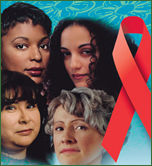Untreated
HIV Increases Inflammation in Women
SUMMARY
Women with untreated HIV infection had different cytokine
patterns and higher levels of inflammatory biomarkers
than HIV negative WIHS participants, but antiretroviral
therapy largely reversed this effect. |
By
Liz Highleyman
 A
growing body of evidence indicates that many of the detrimental
effects of chronic HIV infection may be related to excessive
immune activation and ongoing inflammation. Over decades of
infection, CD4 T-cells and other immune cells appear to age
prematurely and "burn themselves out."
A
growing body of evidence indicates that many of the detrimental
effects of chronic HIV infection may be related to excessive
immune activation and ongoing inflammation. Over decades of
infection, CD4 T-cells and other immune cells appear to age
prematurely and "burn themselves out."
The
SMART
treatment interruption trial and other studies have shown
that consistent antiretroviral
therapy (ART) reduces inflammation and its negative effects.
Other researchers, however, have found that changes in inflammation
and immune activation related to HIV infection persist even
among people with undetectable viral load on ART. Some of
these changes have been shown to promote HIV replication and
disease progression, while others have opposite effects.
As reported in the May
12, 2011, advance online edition of AIDS, Sheila
Keating and fellow investigators with the Women's Interagency
HIV Study (WIHS) compared the extent and type of cytokine
changes in women with and without HIV.
The researchers measured 32 cytokines and related immune biomarkers
in a cross-sectional study of WIHS participants in 3 groups:
women who responded well to combination ART and had undetectable
HIV RNA (n = 17); untreated HIV positive non-controllers (n
= 14), and HIV negative women (n = 17). The study population
as a whole was predominantly African-American and the median
age was approximately 38 years.
Results
 |
Several
cytokines and chemokines (chemical messengers) showed
significant differences between untreated non-controllers
and HIV negative participants. |
 |
Relative
to HIV negative women, the untreated HIV positive group
had: |
| |
 |
Elevated
IP-10; |
 |
Elevated
tumor necrosis factor-alfa (TNF-alfa); |
 |
Decreased
interleukin 12 (IL-12); |
 |
Decreased
IL-15; |
 |
Decreased
fibroblast growth factor 2 (FGF-2). |
|
 |
Overall,
biomarker levels among women on ART more closely resembled
those of HIV negative women, with the exception of TNF-alfa
and FGF-2. |
 |
In
an analysis of the combined HIV positive ART-treated and
untreated groups, IP-10 showed a strong positive correlation
with viral load and a negative correlation with CD4 T-cell
count. |
 |
The
growth factors FGF-2, VEGF, and EGF and all showed a positive
correlation only with increased CD4 count. |
Based
on these findings, the researchers wrote, "Untreated,
progress[ive] HIV infection was associated with decreased
serum levels of cytokines important in T-cell homeostasis
(IL-15) and T-cell phenotype determination (IL-12), and increased
levels of innate inflammatory mediators such as IP-10 and
TNF-alfa."
"[Highly active antiretroviral therapy] was associated
with cytokine profiles that more closely resembled those of
HIV uninfected women," they continued. "The distinctive
pattern of cytokine levels in the 3 study groups may provide
insights into HIV pathogenesis, and responses to therapy."
"While most of the cytokine changes previously described
to be elevated or reduced during chronic HIV infection were
confirmed in our cohort of women with uncontrolled HIV replication,
we did not find significant elevations reported by others
in predominantly male populations," the researchers explained
in their discussion. "Although median IL-10 levels in
our untreated HIV-infected group were nearly 2-fold higher
compared to the HIV-negative participants, this difference
was not statistically significant. In contrast, median IL-6
and FGF-2 values were lower in the [non-controller] than [the
HIV negative] group."
Noting
that some researchers have observed other types of cytokine
changes in people with early infection, the authors said these
differences "highlight the fact that the interaction
between HIV and the immune system is likely very different
in primary and chronic HIV."
In
summary, they concluded, "we found that compared to HIV-negative
women, untreated chronic HIV infection was associated with
defects in T-cell signaling pathways, coupled with evidence
of activation of the innate immune system, and these differences
were less apparent or absent in HAART-treated women with undetectable
viral load."
Investigator affiliations: Blood Systems Research Institute,
San Francisco, CA; Departments of Laboratory Medicine, Pharmacy,
and Medicine, University of California, San Francisco, CA;
Johns Hopkins Bloomberg School of Public Health, Baltimore,
MD; Keck School of Medicine of the University of Southern
California, Los Angeles, CA; Georgetown University Medical
Center, Washington, DC; Albert Einstein College of Medicine,
Bronx, NY; SUNY Downstate Medical Center, Brooklyn, NY; Department
of Medicine, Stroger Hospital, Chicago, IL; Rush University
Medical Center, Chicago, IL.
5/24/11
Reference
SM
Keating, ET Golub, M Nowicki, et al (Women's Interagency HIV
Study). The effect of HIV infection and HAART on inflammatory
biomarkers in a population-based cohort of US women. AIDS
(abstract).
May 12, 2011 (Epub ahead of print).
